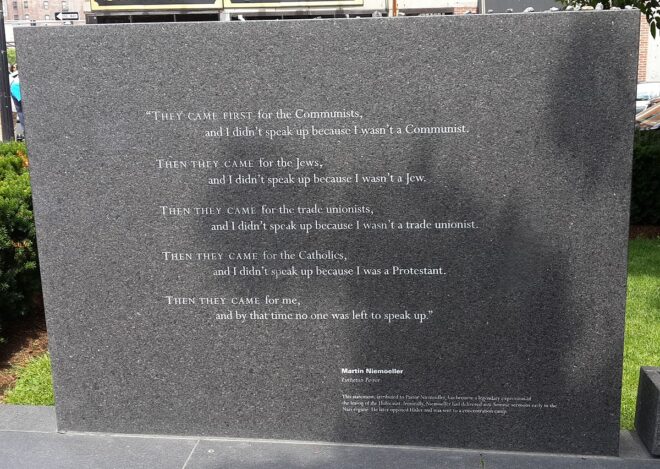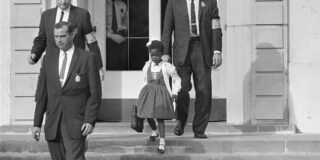
Abstract
This paper explores the complex journey of Martin Niemöller, a German Lutheran pastor whose initial support for Adolf Hitler transformed into profound regret and opposition to the Nazi regime. Through an examination of his reflections, particularly those captured by his former cellmate Leo Stein, this research addresses the moral dilemmas faced by individuals during turbulent times, the dangers of blind faith in political leaders, and the possibility of redemption through personal accountability and activism. The paper argues that Niemöller’s journey serves as a crucial reminder of the importance of vigilance against authoritarianism and the necessity of standing against injustice, ultimately offering a message of hope and resilience.
Introduction
In the annals of history, narratives emerge that challenge our understanding of morality, faith, and the human condition. One such story is that of Martin Niemöller, whose journey from a supporter of Adolf Hitler to a vocal critic of the Nazi regime epitomizes the complexities of human conscience in times of moral crisis. This paper aims to explore the duality of Niemöller’s experience, examining both his initial alignment with a regime that would ultimately betray him and his subsequent path to redemption. By engaging with primary sources, including Leo Stein’s reflections, this research will illuminate the broader societal implications of Niemöller’s story while emphasizing the enduring relevance of his legacy in contemporary discussions of faith, justice, and human rights.
Historical Context
The Rise of the Nazi Regime
To understand Niemöller’s journey, it is crucial to consider the historical context of early 20th-century Germany. The aftermath of World War I and the Treaty of Versailles left Germany in a state of economic turmoil and national humiliation. Amidst this discontent, Adolf Hitler and the Nazi Party rose to power, promising to restore national pride and stability. Many, including Niemöller, were initially drawn to these promises, believing that Hitler would protect traditional values and institutions, including the Church.
Niemöller’s Initial Support
Niemöller’s initial support for Hitler was rooted in a desire to shield the Church from the perceived threats of atheism and socialism. His meeting with Hitler in 1932, during which Hitler assured him of the regime’s commitment to safeguarding religious institutions, further solidified this belief. Niemöller’s reflections reveal a man caught in the web of his own convictions, struggling to reconcile his faith with the political realities of his time. He stated, “I find myself wondering about that too. I wonder about it as much as I regret it. Still, it is true that Hitler betrayed me.”
The Shift to Opposition
As the Nazi regime’s true nature became apparent, particularly with the onset of the Holocaust, Niemöller’s conscience could no longer align with his previous beliefs. His realisation of the moral failures inherent in his earlier support marked a turning point in his life. He began to speak out against the regime, emphasising the moral imperative to protect the marginalised, including the Jewish community he had once overlooked. Niemöller’s journey from complicity to resistance serves as a powerful testament to the capacity for change and the importance of acknowledging past mistakes.
Thematic Analysis
Regret and Accountability
Niemöller’s reflections are steeped in regret, particularly as he acknowledges the collective responsibility of those who supported the regime. He stated, “I am paying for that mistake now; and not me alone, but thousands of other persons like me.” This recognition of shared culpability underscores a crucial aspect of moral responsibility. It invites a broader discourse on the implications of individual choices within a collective societal framework, especially during periods of political upheaval.
Faith and Moral Conscience
Niemöller’s journey is also a profound exploration of faith and moral conscience. His initial support for Hitler was, in part, a reflection of his desire to align religious beliefs with political action. However, as the regime’s atrocities became undeniable, Niemöller’s faith compelled him to take a stand against injustice. His transformation illustrates the potential for faith to serve as a catalyst for moral action, urging individuals to confront uncomfortable truths and advocate for justice.
The Possibility of Redemption
The narrative of Niemöller’s life ultimately conveys a message of redemption. His willingness to confront his past and actively oppose the regime, even at great personal risk, exemplifies the resilience of the human spirit. Niemöller’s story serves as a reminder that redemption is possible, even for those who have erred. It highlights the importance of introspection, accountability, and the courage to stand against wrongdoing.
Contemporary Relevance
Vigilance Against Authoritarianism
In our contemporary world, the echoes of Niemöller’s experiences resonate with ongoing struggles for justice and human rights. The rise of authoritarianism in various forms across the globe serves as a stark reminder of the lessons learned from Niemöller’s life. His story emphasises the necessity of vigilance and active resistance against oppressive regimes, urging individuals to remain aware of the moral implications of their political choices.
The Legacy of Activism
Niemöller’s legacy extends beyond his personal journey; it calls for a collective commitment to activism and social justice. In a time marked by division and hatred, his story inspires individuals to confront their own beliefs and take a stand against injustice. The path to redemption, as illustrated by Niemöller, begins with a willingness to acknowledge past mistakes and advocate for a more just society.
Conclusion
The journey of Martin Niemöller is one of profound complexity, marked by initial complicity, deep regret, and a courageous pursuit of redemption. His reflections, particularly as captured by Leo Stein, provide valuable insights into the moral dilemmas faced by individuals during times of crisis. Niemöller’s story serves as a crucial reminder of the dangers of blind faith in political leaders and the importance of standing against injustice. His legacy invites us to carry forward his message of introspection, accountability, and resilience, ensuring that the lessons of the past inform our actions in the present and future. The path to redemption, though fraught with challenges, is illuminated by the commitment to justice and the unwavering belief in the potential for change.
References
1. Stein, Leo. “Reflections on Martin Niemöller.” The National Jewish Monthly, 1941.
2. Niemöller, Martin. “Confession of a Pastor.” Various sources on Niemöller’s writings and speeches.
3. Historical accounts of the Nazi regime and its impact on German society.
4. Scholarly analyses of moral responsibility and faith during the Holocaust era.


